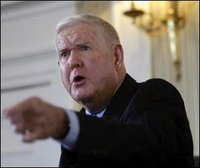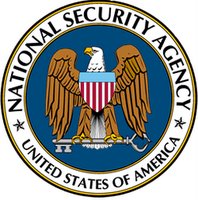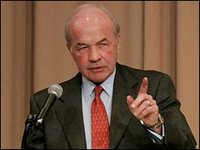President Bush spoke before the World Affairs Council in Philadelphia yesterday. As the Philadelphia Inquirer reports, it was not a hand-picked audience: Faeze Woodville, an Iranian American from Strafford, Chester County, won scattered applause when she asked Bush why he and other administration officials "keep linking 9/11 to the invasion of Iraq."
Bush has acknowledged that there is no direct link between Iraq and the terrorist attacks on Sept. 11, 2001, but he and other top officials often spoke about 9/11 in presenting the case for war with Iraq.
 Eighteen months ago, Joe Biden, the commencement speaker at the University of Delaware, was booed for making the same point; Iraq had nothing to do with 9/11.
Eighteen months ago, Joe Biden, the commencement speaker at the University of Delaware, was booed for making the same point; Iraq had nothing to do with 9/11.
The News Journal story on Bush's speech features the puzzling headline, "Bush defends new Iraq plan in Phila." Meet the new plan; same as the old plan. Rep. John Murtha disagrees with the premise of the story: "I still don't see a plan that will prevail," Rep. John Murtha told reporters. "It's more of a hope that everything will turn out right."
(Photo: The News Journal/Bob Herbert)
 The New York Times published this photo by Tyler Hicks of refugees gathered in the the sweltering Superdome.
The New York Times published this photo by Tyler Hicks of refugees gathered in the the sweltering Superdome.  Sidney Blumenthal, writing in the Guardian, described the disaster as "Biblical in its uncontrolled rage and scope," while noting that the disaster was not entirely an act of God. Eric Gay produced a compelling series of photos for the AP. This firestorm raged out of control as firefighters were overwhelmed by the disaster.
Sidney Blumenthal, writing in the Guardian, described the disaster as "Biblical in its uncontrolled rage and scope," while noting that the disaster was not entirely an act of God. Eric Gay produced a compelling series of photos for the AP. This firestorm raged out of control as firefighters were overwhelmed by the disaster.  Gay took this gruesome photo of an old man who died waiting to be rescued. One survivor summed up the tragedy, saying, "They died right here in America, waiting for food."
Gay took this gruesome photo of an old man who died waiting to be rescued. One survivor summed up the tragedy, saying, "They died right here in America, waiting for food."


















